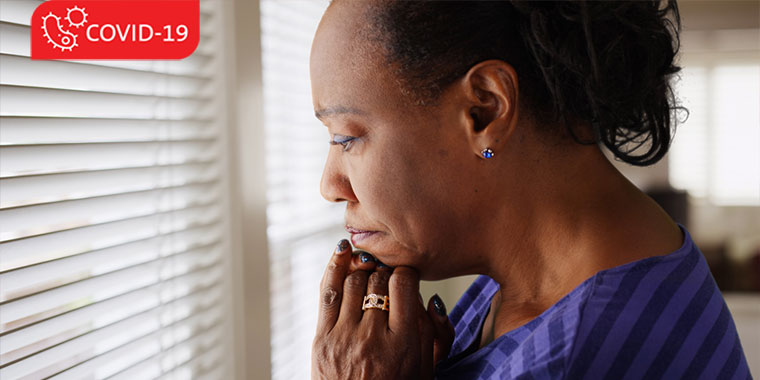Learning New Ways To Grieve During COVID-19

Find Your Perfect Match
Answer a few questions and we'll provide you with a list of primary care providers that best fit your needs.
As we adjust to life under stay-at-home orders, we all are experiencing feelings of grief.
From the loss of normal life and milestones we looked forward to celebrating, to the disruption of funeral and memorial services, we are mourning. Perhaps you cannot visit a loved one in the hospital or won’t be able to celebrate a family graduation, wedding, or baby shower.
To learn how we can cope with grief amid the daily stress of coronavirus COVID-19, we talked with the Rev. Dr. Steven Ingram, pastoral counselor at Miami Valley Hospital.
“Grief is our whole body’s response to loss,” Rev. Ingram says. “We often associate grief with death, but in these times, we are experiencing all kinds of loss.”
Daily life now includes major changes to our routines and feelings of safety. We react to all of this in many ways, through our emotions, how our body feels, and our thoughts. One way we minimize loss is to tell ourselves that there is something wrong with us, Rev. Ingram says.
“We think we can ignore our grief and not acknowledge it and it will go away,” Rev. Ingram says. “One thing we know from trauma studies is that you can pay now, or you can pay later. Our bodies keep the score.”
The key to staying mentally and physically healthy is to make time to pay attention to your grief and acknowledge and respond to your losses, Rev. Ingram says. We all grieve in different ways and we all have some reaction to the impact of loss. “Everyone cries, but not everyone sheds tears.”
Ways To Express Your Grief
Many working an essential job, like doctors and nurses, or parents working from home while also managing a child’s online learning, may feel they cannot stop to address their feelings.
“Pick out something to ritualize a moment in time that reminds you to refer back to it later,” says Rev. Ingram.
For example, if you are a nurse treating a patient who reminds you of your grandfather, write “grandfather” on a post-it note, put it in your pocket and know that you will reflect on it later.
“What causes a great deal of stress is not having a reliable place to put a memory of our experiences and give our bodies and minds acknowledgment and expression of our grief,” says Rev. Ingram.
When you find a quiet moment, pull out that post-it note.
- Find a quiet place.
- Play soothing music, if you like.
- Take three deep breaths.
- Breathing gives a pathway for your emotions to express the impact of losses in your life.
- Allow yourself to acknowledge that something significant happened.
- You don’t need to have the perfect words to describe it.
- Sometimes your response may be feelings of sadness, hurt, or thinking, “I never thought this would happen to me.”
- Talk with a trusted person about how you are feeling.
- If no trusted person is available, trust yourself.
- Try journaling.
- Write down whatever comes to mind or whatever you are feeling in your heart and body.
“Most of us hold in emotions so much. When we do let go, we think we will be overwhelmed,” Rev. Ingram says. “The courage to face that gives expression to what needs to flow through us, and our bodies have a wonderful way to govern that.”
Help Children And Teens Cope
To help children and teens address missed milestones or the cancellation of a special trip or event, talk with them about how the change in plans equates to a loss. Then allow them – and yourself – to dream.
“Acknowledge the loss of hope and create something new,” Rev. Ingram says. He suggests these activities:
- Discuss what you thought the event would be like.
- Cut out pictures from a magazine about what you hoped for during the event.
- Create a collage of those pictures.
- Discuss plans for a new event when we can gather/travel again.
Embrace New Experiences
The current environment does give us access to new experiences. We can’t meet in person, but we can meet online through video calls. We can’t hug physically, but we can hug one another with our words and with our presence from afar.
“It’s a more intentional way of making an emotional connection that can be more powerful than a hug or a handshake,” Rev. Ingram says. “We are gaining a new experience toward one another, that even though it may be inconvenient, it’s a lot more intimate.”
Find Your Perfect Match
Answer a few questions and we'll provide you with a list of primary care providers that best fit your needs.
Rev. Dr. Steven Ingram, Pastoral Counselor at Miami Valley Hospital; American Psychological Association; CNN; Harvard Business Review





